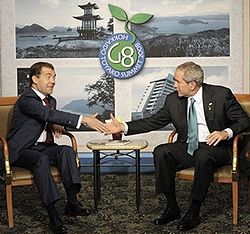 |
| Photo AP |
In their first sit down as heads of state, Bush called Medvedev a ``smart`` guy who is well versed in foreign policy. Medvedev casually referred to Bush as ``George.`` Yet they inched no closer on the missile defense issue during their more than hour-long discussion on the sidelines of a summit here.
A Kremlin aide described the private meeting as open and constructive, but ``at times critical.``
The public comments by the two presidents only glossed over Russia`s anger over missile defense. And they both brushed off the fact that their official relationship will expire in fewer than 200 days when the Bush presidency ends.
``We will build on the relationship with the new American administration,`` said Medvedev. ``But we still have six months with the effective administration and we`ll try to intensify our dialogue with this administration.``
The Russian leader said he and Bush agreed on curtailing the nuclear weapon capability of Iran and North Korea.
``But then certainly there are others with respect to European affairs and missile defense where we have differences,`` Medvedev said. ``We would like to agree on these matters, as well, and we also feel very comfortable in our dealings with George.``
Like former Russian President Vladimir Putin, still the top powerbroker in Moscow, Medvedev remains critical of the West, in particular the United States. He has shown no sign of softening opposition to U.S. plans for missile defense facilities in Europe or to NATO`s promise to eventually invite Georgia and Ukraine in.
Personal relations between the two appear warm, but Bush didn`t go as far as to repeat what he said about Putin when he first met him in June 2001. Then, Bush said he looked into Putin`s eyes and ``was able to get a sense of his soul.``
``I`m not going to sit here and psychoanalyze the man, but I will tell you that he`s very comfortable, he`s confident, and that I believe that when he tells me something, he means it,`` Bush said.
The two, however, are at opposite ends of their political lives. Bush is on his way out and Medvedev just took office in May. This is Bush`s eighth and final G-8. This is Medvedev`s freshman year at the summit.
``I reminded him that yes I`m leaving, but not until six months, and I`m sprinting to the finish,`` Bush said. ``So we can get a lot done together, and you know there are a lot of important issues like Iran. There`s an area where Russia and the United States have worked closely in the past and will continue to work closely to convince the regime to give up its desire to enrich uranium.``
The two leaders, who also are also are united in their fight against international terrorism and want to see a Middle East peace accord and a future for Afghanistan, talked on the sidelines of the Group of Eight summit of industrialized nations. Japan is hosting the event at a heavily guarded luxury resort atop Poromoi Mountain in Hokkaido, an island in northern Japan.
From there, visitors normally can see the doughnut-shaped Lake Toya, formed in a crater of a collapsed volcano. Not Monday. Sheets of rain pelted the scenic mountain and the weather offered a metaphor for the contentious U.S.-Russia discussions on missile defense: Fogged in.
U.S. and Polish officials are negotiating to base American missiles in Poland for a future missile shield against Iran. Still, there is no guarantee the shield will ever be built or would work as advertised. Negotiations over the 10 missile interceptors are proving more contentious than the U.S. had anticipated.
The site would be linked to a missile-tracking radar that Washington wants to place in the Czech Republic. The Czech government has agreed in principle to the plan, but parliament`s approval is still needed.
Russia is staunchly against the U.S. plans, arguing that U.S. military installations in former Soviet satellites so close to its borders would pose a threat Russian security. Moscow has threatened to aim its own missiles at any eventual base in Poland or the Czech Republic.
The U.S. maintains that the plan poses no threat to the Kremlin`s vast nuclear arsenal.
After the talks, a Kremlin aide accentuated the positive in U.S.-Russian relations, but said Bush and Medvedev made no progress on the missile-defense issue - the major point of disagreement between them.
Sergei Prikhodko said the talks were ``exclusively well-intentioned, constructive, and open, but at times critical.``
Prikhodko said Russia is not yet satisfied with transparency measures the United States has offered to take in order to ease Moscow`s concerns the system would be aimed at weakening Russia`s defenses.
Medvedev also expressed serious concern about media reports that the U.S. has discussed the possibility of deploying interceptors in Lithuania, if its first choice of basing them in Poland doesn`t work out.
``This is absolutely unacceptable for the Russian Federation,`` Prikhodko said of the Lithuanian plan.
Bush and Medvedev met on the opening day of the summit, a day focused on aid to Africa and on whether the world`s economic powers were providing enough financial assistance to fight disease and improve health care.
Bush, who also attended summit sessions with several African nations, is calling on G-8 nations to write checks to make good on their pledges to help battle HIV-AIDS, malaria and other diseases.

